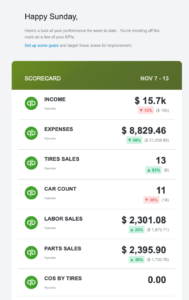What is a scorecard?
A scorecard is an instrument for monitoring and reporting a company’s financial Performance. In essence, it is a dashboard that provides financial facts. Scorecards offer a brief snapshot of a company’s financial situation, enabling owners to spot problem areas immediately. Depending on the organization’s needs, scorecards can be modified into various financial data. Revenue, costs, profit margins, and cash flow are a few examples of metrics that could be listed on a scorecard.
Why Are Scorecards Used?
Scorecards are a valuable tool for small businesses because they help business owners stay on top of their finances. Regularly tracking financial metrics allows business owners to spot patterns and trends in their financial data that can help them make better decisions. Scorecards offer a structure for financial accountability as well. Business owners may ensure that their financial decisions align with their overall business strategy by setting clear financial goals and monitoring their progress toward achieving them.
What Metrics Should You Track?
Firms should track different metrics on their scorecards depending on their particular conditions. However, several key financial metrics are important for most businesses to track. These consist of cash flow, expenses, gross profit margin, and net profit margin. By tracking these data, business owners can gain a comprehensive picture of their financial health and spot areas that need repair.
What is the Best Way to Make a Scorecard?
The first step in developing a scorecard is to decide which metrics are most critical to your company’s success and how you will gather and publish the necessary data. To track financial data, many organizations utilize accounting software or spreadsheets. A simple scorecard can be made with the help of these resources. Data visualization software like Tableau or Google Data Studio can be necessary for more complex scorecards. The secret is to develop a scorecard that offers clear insights into your company’s financial performance and is simple to read and understand.
We at Ceptrum send a scorecard of important KPIs straight to your inbox. We work closely with business owners to identify the important KPIs, then track those KPIs and send alerts when something needs attention.
Here’s an example of a simple scorecard:
How to Use a Scorecard?
Creating a scorecard is just the beginning. Business owners should ideally evaluate their scorecard every month. This enables them to monitor their financial development and spot any areas that need improvement. The scorecard might assist in determining the main reason why a company is performing poorly in a particular area. Business owners can enhance their financial Performance over time by acting to solve the issue.
Scorecards and Business Planning:
Scorecards can be useful for long-term company planning. Owners of small businesses can spot trends and patterns in their financial data by collecting financial measures over time. The business’s future course can be decided using this information as guidance. For instance, a business owner might consider expanding the company if it continually generates increased revenue while maintaining steady expenses. Alternatively, if costs are consistently high, the business owner may consider reducing expenses or allocating resources to another part of the company.
How Scorecards Help You Make Better Decisions:
Scorecards offer a variety of data that can aid in better financial decision-making for business owners. Business managers can spot areas that need attention and take action to fix them by routinely reviewing financial metrics. This could assist the company’s overall financial situation. Scorecards can also assist business leaders in making decisions about the direction of their company. Business owners can strategically position their companies for long-term success by examining financial data trends.
Read More:
Conclusion:
For small firms aiming to boost their financial performance, scorecards are useful. Business owners can spot areas that need improvement and decide on the future course of the company by regularly reviewing financial data and utilizing the insights gathered from scorecards. Business owners may remain on top of their finances and set up their companies for success by developing a scorecard customized to their particular needs and using it frequently.
It’s crucial to understand that scorecards are not a panacea for improving financial Performance. Scorecards are one tool in a business owner’s toolkit but can offer insightful information on a company’s financial health. Additionally, business owners should collaborate with their financial advisors to create a thorough financial plan considering their situation.
To sum up, scorecards are a useful tool for assisting small businesses in becoming more financially successful. By reviewing key financial data on a regular basis and utilizing the insights gathered from scorecards, business leaders may identify areas for improvement and decide on the future course of their company. Scorecards can be a useful addition to any small business owner’s financial toolset, even though they do not replace thorough financial planning.







